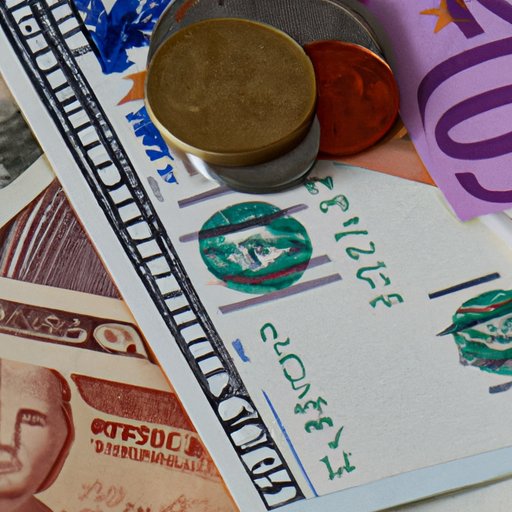Introduction
When traveling abroad, it is important to consider how much cash you should bring with you. Carrying too much cash can make you a target for theft, while carrying too little could leave you without money in an emergency. Evaluating your estimated costs and expenses, researching currency conversion rates, and understanding the risks associated with carrying large amounts of cash are all important aspects of preparing financially for an international trip.

Calculating the Optimal Amount of Cash to Carry When Traveling Internationally
The first step in calculating the optimal amount of cash to carry on an international trip is to evaluate your estimated costs and expenses abroad. Consider the length of your trip, the cost of accommodations and transportation, any activities you plan to do, and the amount of money you will need for food and incidentals. Once you have a rough estimate of your total expenses, you can begin to research currency conversion rates.
Knowing the current exchange rate between your home currency and the currency of the country you’re visiting is essential for calculating how much cash you need. Conversion rates can fluctuate quickly, so it’s best to check them regularly leading up to your trip. You can find currency exchange rates online or at your local bank. Once you have the current exchange rate, you can estimate the amount of cash you need for your trip.

Tips for Staying Safe When Carrying Large Amounts of Cash on International Trips
Once you have calculated the optimal amount of cash to carry on your trip, you need to consider how to keep it safe. Taking precautions to protect yourself and your cash is essential when traveling overseas. Here are a few tips to keep in mind:
- Choose secure locations for storing your cash. If you’re staying in a hotel, always use the in-room safe or the front desk safe deposit box. Never keep your cash in your pocket or purse.
- Limit the amount of cash you carry at any one time. Keeping only the amount of cash you need for that day in your wallet or purse will help reduce the risk of theft.
- Keep a record of where and when you stored your money. Make sure to note the location and date each time you store your cash in a secure location.
How to Make Sure Your Cash is Secure During International Travels
In addition to choosing secure locations for storing your cash, there are other ways to ensure your money remains safe while traveling. Using a money belt or other secure storage solutions can help protect your cash from theft. Additionally, keeping your cash in multiple locations, such as your hotel room safe, a money belt, and a secure pocket in your luggage, can further reduce the risk of loss or theft.
It is also important to avoid potentially dangerous areas when carrying large amounts of cash. Be aware of your surroundings at all times and don’t take unnecessary risks. If you are concerned about your safety, it may be wise to limit the amount of cash you carry and use credit or debit cards instead.
The Pros and Cons of Taking Cash vs. Credit Cards Abroad
When deciding whether to take cash or credit cards on an international trip, it is important to weigh the pros and cons of both. Taking cash has the advantage of being more readily available when needed, but it is also more vulnerable to theft. Credit cards offer the convenience of not having to carry large amounts of cash, but they can also be subject to fraud and foreign transaction fees.
Ultimately, the decision of whether to take cash or credit cards depends on your individual circumstances and preferences. If you decide to take both, consider setting aside some cash in a secure location in case of emergencies.

Preparing Financially for Emergencies When Traveling Overseas
No matter how well you plan for an international trip, unexpected events can occur. To prepare financially for these types of emergencies, it is important to set aside some funds for unexpected expenses. Additionally, obtaining travel insurance can help provide financial protection against medical emergencies, lost luggage, and other unforeseen events.
Understanding Currency Exchange Rates and Fees When Traveling Abroad
Finally, it is important to understand currency exchange rates and fees when traveling abroad. Researching current exchange rates and understanding the fees associated with exchanging currencies can help you get the most bang for your buck. Some banks and credit card companies offer better rates than others, so it is worth comparing prices before exchanging your currency.
Conclusion
Deciding how much cash to travel with internationally requires careful planning and financial preparation. Evaluating your estimated costs and expenses abroad, researching currency conversion rates, and understanding the risks associated with carrying large amounts of cash are all important aspects of preparing for an international trip. Additionally, taking precautions to protect your cash and understanding currency exchange rates and fees can help you get the most out of your money while traveling abroad.
In summary, determining the optimal amount of cash to carry on an international trip requires careful consideration of your estimated expenses and the current exchange rate, as well as tips for staying safe and understanding currency exchange rates and fees. Following these steps can help ensure a successful and safe international trip.
(Note: Is this article not meeting your expectations? Do you have knowledge or insights to share? Unlock new opportunities and expand your reach by joining our authors team. Click Registration to join us and share your expertise with our readers.)
